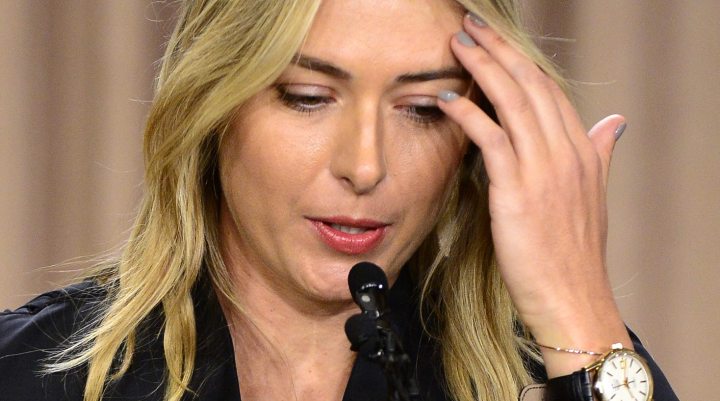Sport
Tennis doping: Public relations volley will not save Sharapova

While Maria Sharapova has tried to maintain that taking a banned substance was just a genuine mistake, anecdotal evidence and opinions from doctors seem to suggest otherwise. In a sport with an anti-doping programme which has been routinely criticised, it means her fall from grace might have only just begun. By ANTOINETTE MULLER.
When it comes to brand worth, very few sportspeople in the world can lay claim to doing as well as Maria Sharapova has done over recent years. At 28, she is one of the richest women in the world and one of the most recognised sports stars. Despite having struggled with injury over recent years, she could probably retire before she hits 30 without stressing too much about her future. When her team said she would make a “major announcement” many reporters expected that she would call it a day. After all, she had been struggling with injuries for some time and although she is still in the top 10 tennis players, her heyday had clearly passed.
She’d had a decent career, which included five Grand Slam titles, millions in prize money and even more in endorsement deals. In fact, most of her money is earned off the court these days with $23-million of her $29.7-million estimated earnings coming from off-the court deals. Brand Sharapova was immaculate and powerful and it would take something extraordinary to topple it. Over the course of the last few days, that is exactly what has happened.
When Sharapova found out that one of her samples had tested positive for 3-(2,2,2-trimethylhydrazinium) propionate dihydrate, otherwise known as meldonium, her and her team’s first thoughts would probably have been damage control and if you glossed over social media, you might have thought that they’d broadly succeeded. The overwhelming response was: “This is how you deal with a crisis.”
The drug manufacturer told AFP this week that the “usual” treatment period of the drug should not last longer than six weeks. It also emerged that she was warned five times in the month leading up to her testing positive that the substance was on the banned list.
Grindeks, the drug’s manufacturer, does not think it is a performance enhancer. Grindeks spokeswoman Ilze Gailite said in an e-mailed statement: “Any suggestions to include meldonium in the prohibited list have no scientific basis and are not justified. We strongly believe that meldonium should not be considered as doping but an effective medicine which is widely used in clinical practice and it should not be included in the prohibited list.”
It seems the drugmaker has been forced into the damage control routine too.
The drug, usually used to treat severe heart issues, dilates blood vessels and increases bloodflow to the rest of the body. It’s manufactured in Latvia and used widely in Russia and Eastern Europe, but is not registered for use in South Africa or the United States where Sharapova has lived since she was a teenager.
Alarmingly, surveys conducted showed that about 18 percent of Russian athletes have used the drugs, while globally that figure sits at about 2 percent and since Sharapova revealed her positive test seven Russian athletes have been confirmed as having tested positive for meldonium. Among those provisionally suspended are an Olympic gold medallist in short-track speedskating, Semion Elistratov, and his teammate, the world champion Pavel Kulizhnikov.
Other athletes who have tested positive for the drug are 2013 world 1,500m champion Abeba Aregawi, an Ethiopian-born Swede, Tour de France cyclist and former Russian road race champion Eduard Vorganov, Russian Olympic ice dancer Ekaterina Bobrova and Ukrainian biathletes Olga Abramova and Artem Tyschcenko. With so many names on the list of positives, the damage control is starting to look more like a botched Malcolm Tucker routine than a genuine attempt to repent.
Sharapova insists she took the drug for a “heart condition”, but there has been little sympathy from those who lead the fight against anti-doping. The World Anti Doping Agency’s first president, Dick Pound, called Sharapova and her team “reckless beyond description” for failing the test.
“You are taking something on a list. I am sorry, that is a big mistake — of course she should have known,” said Pound, who was head of Wada from 1999 to 2007.
“She is taking something that is not generally permitted in her country of residence [the US] for medical purposes, so she says, so there must be a doctor following this,” he told the BBC.
Dr Jeroen Swart, a sports physician and exercise physiologist at the Sports Science Institute in Newlands, agrees. “Did she take it for medicinal reasons? Highly, highly unlikely. An athlete at the level would not be prescribed it for a cardiac condition. It’s not impossible that it’s the case, but implausible,” he told Daily Maverick. “It almost certainly must have been an oversight that she was taking it while it was on the banned list. There’s very little chance that she took it knowing that she would test positive for it. I think that her statement that it was an oversight is almost certainly true, her statement that she was taking it for medicinal reasons is almost certainly untrue.”
Whether or not Sharapova declared that she was taking the substance before she was tested has, strangely, not been established yet, but none of her team can plead complete ignorance. In 2012 a report from the Baltic Sport Science Conference noted that mildronate (as it is also known) “is recommended for use as pharmacological remedy that increases physical work capabilities of athletes. Mildronate and its metabolites are not included in the doping list; it does not provoke any undesired side effects.”
Dr Swart notes that while the improvements might be marginal compared to other performance enhancing drugs, for elite athletes marginal improvements often mean the difference between winning or losing.
“The study showed that not only does the drug improve performance, but also improved the impact of stress and improved cognitive ability. Greater ability to run repeatedly to the ball, improved ability to handle the stress of competition, and motor control. In tennis, it’s probably a drug a tennis player would benefit more from than other sports,” says Swart.
The comments from doctors and the anecdotal evidence of the effects of the drug have gnawed away at the image Sharapova tried to project by coming clean, but she is likely not to just have to pay for her own sins, but could become a martyr for a programme which has failed miserably.
She is the first tennis superstar to publicly fail a drug test. It’s not something that will just go away quietly. Many of the brands associated with her have already cut their ties and while her lawyer is hopeful of leniency to the point of no punishment at all because of a “laundry list of extremely mitigating circumstances”, that is looking increasingly unlikely.
Because, as with other sports, the tennis anti-doping programme has been routinely criticised for everything from being insufficiently transparent to being poorly funded. And indeed it is. With just $1bn going to anti-doping in tennis annually, a 10th the total prize money at Wimbledon alone, the criticism is entirely fair. Then there are the rumours of silent bans for top players, with soft bans masked as injuries, none of which has ever been proven.
Officials have always responded to the criticism of the programme lacking money by saying no top player has ever failed a test. But now there is one and if the sport’s anti-doping programme decides to hold this up as a way of showing the “system works”, Sharapova’s argument that she “didn’t know” and all the evidence suggesting that she surely should have will further her fall from grace. DM
Photo: Russian tennis player Maria Sharapova announces that she has tested positive for a banned substance at a press conference at the LA Downtown Hotel in Los Angeles, California, USA, 07 March 2016. Sharapova said she failed a drug test at the Australian Open in January. EPA/MIKE NELSON.



















 Become an Insider
Become an Insider